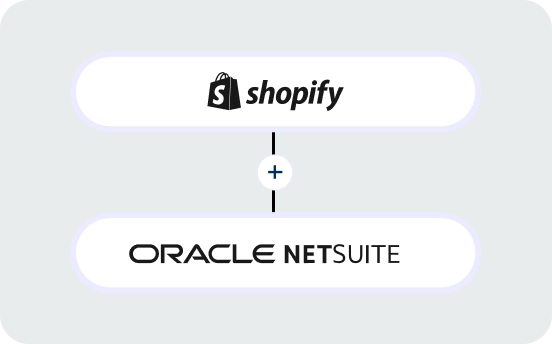From checkout to inventory management
Improving Retail experiences with integrations

How Initus integrations benefit the Retail industry
Retailers integrating software solutions can enhance customer experience, optimize inventory, streamline operations, and gain valuable customer insights. This drives increased sales, loyalty, and overall business growth.
How Initus integrations benefits the Retail industry
Retailers integrating software solutions can enhance customer experience, optimize inventory, streamline operations, and gain valuable customer insights. This drives increased sales, loyalty, and overall business growth.

Initus can resolve challenges of the Retail industry by using integrations
The challenges
The solutions
01 – Disparate Point of Sale (POS) Systems
Retail companies often encounter challenges when using disparate or legacy Point-of-Sale (POS) systems that are not integrated with other vital retail systems. Consequently, this can lead to inconsistencies in product pricing, furthermore, it can contribute to inventory inaccuracies. Moreover, managing promotions becomes significantly more difficult, and finally, there is often limited visibility into crucial sales and customer data.
02 – Inefficient Inventory Management
Lacking a centralized inventory system or integrated inventory systems severely hinders efficient inventory management for retailers. This leads to overstocking or understocking, inaccurate stock visibility, and difficulties with returns. Ultimately, customer experience suffers.
03 – Manual and Time-Consuming Order Fulfillment
Retailers often encounter challenges with manual and time-consuming order fulfillment processes. In the absence of an integrated order management system, retailers are often reliant on manual order processing, consequently leading to inefficiencies, delays, and potential errors in order fulfillment and delivery.
04 – Limited Customer Insights and Personalization
Disconnected systems within the retail industry significantly hinder the ability to gather comprehensive customer data, ultimately preventing retailers from providing truly personalized shopping experiences. As a result of these disconnections, retailers struggle to access critical customer information, such as purchase history, preferences, or past purchase patterns. This lack of access makes it extremely difficult to tailor marketing campaigns effectively or enhance customer loyalty programs.
05 – Lack of Omni-Channel Integration
Integrating online and offline channels is crucial for retailers. Without integration, providing a seamless customer experience across channels (e.g., online stores, physical stores, mobile apps) becomes challenging. This leads to issues like inventory discrepancies, order management problems, and inconsistent pricing, hindering a unified customer experience.
01 – Centralized Retail Management System
Integrating retail management systems, such as Point of Sale (POS), inventory management, and Customer Relationship Management (CRM) software, is crucial for retailers to achieve centralized control and gain comprehensive visibility over their operations. Consequently, this integration allows for accurate pricing across all channels, ensures synchronized inventory levels, and ultimately enables retailers to provide significantly better customer service.
02 – Integrated Inventory Management
Integrating inventory systems with point of sale, ecommerce, and warehouse management systems enables real-time visibility into inventory levels and locations across all sales channels. Consequently, this integration helps retailers optimize inventory replenishment processes, effectively avoid stockouts or overstocks, and ultimately provide accurate product availability information to customers.
03 – Automated Order Fulfillment
Integrating ERP systems with external fulfillment systems automates key processes, such as order processing, inventory allocation, and delivery coordination. As a result, this integration streamlines the entire order fulfillment process, significantly reducing manual errors and ultimately ensuring faster and more accurate fulfillment.
04 – Customer Insights and Personalization
By integrating customer data across various touchpoints, such as Point-of-Sale (POS) systems, e-commerce platforms, and Customer Relationship Management (CRM) systems, retailers can gather comprehensive customer insights. Consequently, this integrated data enables the implementation of personalized marketing efforts, targeted promotions, and ultimately, a significantly improved customer experience tailored to individual preferences and purchase history.
05 – Omni-Channel Integration
Integrating online and offline sales channels is crucial for creating a truly seamless shopping experience for customers. By integrating e-commerce platforms, Point-of-Sale (POS) systems, and inventory management systems, retailers can ensure consistent pricing, promotions, and inventory availability across all channels. Consequently, this integration allows customers to shop seamlessly online, in-store, or through mobile applications with greater ease and convenience.
The challenge
01 – Disparate Point of Sale (POS) Systems
Retail companies often encounter challenges when using disparate or legacy Point-of-Sale (POS) systems that are not integrated with other vital retail systems. Consequently, this can lead to inconsistencies in product pricing, furthermore, it can contribute to inventory inaccuracies. Moreover, managing promotions becomes significantly more difficult, and finally, there is often limited visibility into crucial sales and customer data.
02 – Inefficient Inventory Management
Lacking a centralized inventory system or integrated inventory systems severely hinders efficient inventory management for retailers. This leads to overstocking or understocking, inaccurate stock visibility, and difficulties with returns. Ultimately, customer experience suffers.
03 – Manual and Time-Consuming Order Fulfillment
Retailers often encounter challenges with manual and time-consuming order fulfillment processes. In the absence of an integrated order management system, retailers are often reliant on manual order processing, consequently leading to inefficiencies, delays, and potential errors in order fulfillment and delivery.
04 – Limited Customer Insights and Personalization
Disconnected systems within the retail industry significantly hinder the ability to gather comprehensive customer data, ultimately preventing retailers from providing truly personalized shopping experiences. As a result of these disconnections, retailers struggle to access critical customer information, such as purchase history, preferences, or past purchase patterns. This lack of access makes it extremely difficult to tailor marketing campaigns effectively or enhance customer loyalty programs.
05 – Lack of Omni-Channel Integration
Integrating online and offline channels is crucial for retailers. Without integration, providing a seamless customer experience across channels (e.g., online stores, physical stores, mobile apps) becomes challenging. This leads to issues like inventory discrepancies, order management problems, and inconsistent pricing, hindering a unified customer experience.
The solutions
01 – Centralized Retail Management System
Integrating retail management systems, such as Point of Sale (POS), inventory management, and Customer Relationship Management (CRM) software, is crucial for retailers to achieve centralized control and gain comprehensive visibility over their operations. Consequently, this integration allows for accurate pricing across all channels, ensures synchronized inventory levels, and ultimately enables retailers to provide significantly better customer service.
02 – Integrated Inventory Management
Integrating inventory systems with point of sale, ecommerce, and warehouse management systems enables real-time visibility into inventory levels and locations across all sales channels. Consequently, this integration helps retailers optimize inventory replenishment processes, effectively avoid stockouts or overstocks, and ultimately provide accurate product availability information to customers.
03 – Automated Order Fulfillment
Integrating ERP systems with external fulfillment systems automates key processes, such as order processing, inventory allocation, and delivery coordination. As a result, this integration streamlines the entire order fulfillment process, significantly reducing manual errors and ultimately ensuring faster and more accurate fulfillment.
04 – Customer Insights and Personalization
By integrating customer data across various touchpoints, such as Point-of-Sale (POS) systems, e-commerce platforms, and Customer Relationship Management (CRM) systems, retailers can gather comprehensive customer insights. Consequently, this integrated data enables the implementation of personalized marketing efforts, targeted promotions, and ultimately, a significantly improved customer experience tailored to individual preferences and purchase history.
05 – Omni-Channel Integration
Integrating online and offline sales channels is crucial for creating a truly seamless shopping experience for customers. By integrating e-commerce platforms, Point-of-Sale (POS) systems, and inventory management systems, retailers can ensure consistent pricing, promotions, and inventory availability across all channels. Consequently, this integration allows customers to shop seamlessly online, in-store, or through mobile applications with greater ease and convenience.
Start shaping the future of your business
Today is a great day to optimize your
Sales Operations Audit Process e-Commerce Channel Data Migration Project Procurement Process Inventory Management
with Initus

Our Solutions
Unlock the full potential of your retail business with the perfect partnership: Shopify and NetSuite integration
Designed for Simplicity, Built for Power
Whether you need standard integrations or want to tap into the power of AI, InitusIO offers a complete solution. What sets us apart? Our seamless setup, expert support, and ability to handle both regular and AI-enhanced integrations with ease.

Tailored for Your Business
We assess your unique needs and design integrations to drive efficiency in the processes that matter most.

Quick and Seamless Integration
Skip the complexities—our turnkey solution is built for fast, seamless deployment.

Scalable and Secure
InitusIO grows with your business, ensuring scalability and security at every step.
